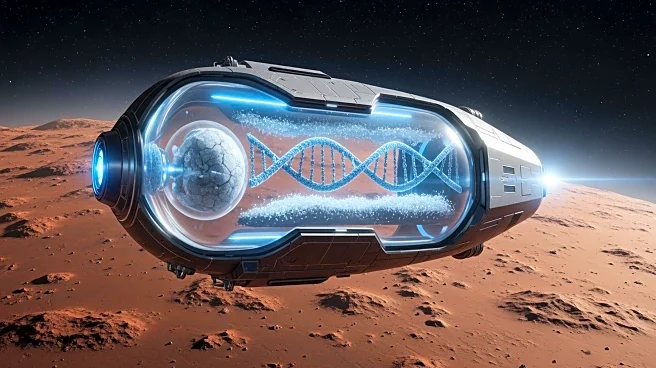What's Happening?
Celestis, a Texas-based company known for its space burial services, has announced the start of reservations for its Mars300 mission. This project aims to send cremated human remains and DNA samples into
orbit around Mars, with a tentative launch date set for 2030. Since 1997, Celestis has conducted several flights, sending capsules containing ashes and DNA of deceased individuals and animals beyond Earth. The latest mission utilized the Vulcan Centaur rocket from United Launch Alliance. Although the specific spacecraft for the Mars300 mission is yet to be determined, SpaceX's Starship is considered a likely option. The cost for participating in the mission is approximately $25,000, with reservations now open requiring a 10% prepayment. Celestis emphasizes adherence to COSPAR's planetary protection protocols to preserve the Martian environment.
Why It's Important?
The Mars300 mission represents a significant step in space burial services, expanding the possibilities for memorializing loved ones beyond Earth. This initiative could impact the space industry by increasing demand for commercial space flights and services. It also highlights the growing interest in space exploration and the potential for private companies to contribute to scientific missions. The adherence to planetary protection protocols underscores the importance of ethical considerations in space exploration, ensuring that human activities do not contaminate extraterrestrial environments. This mission could pave the way for future endeavors in space memorials, potentially influencing public perception and policy regarding space exploration.
What's Next?
As the Mars300 mission progresses, Celestis will continue to accept reservations and finalize details regarding the spacecraft and launch logistics. The company will likely collaborate with SpaceX or other aerospace firms to ensure the successful delivery of the payload. Stakeholders, including participants and space enthusiasts, will be watching closely for updates on the mission's development. The adherence to planetary protection protocols will be crucial, potentially influencing future regulations and standards for private space missions. The success of Mars300 could lead to increased interest in space burial services, prompting other companies to explore similar ventures.
Beyond the Headlines
The Mars300 mission raises ethical questions about the commercialization of space and the implications of sending human remains beyond Earth. It challenges traditional notions of memorialization, offering a unique way to honor loved ones. The mission also highlights the intersection of science, technology, and culture, as it combines space exploration with personal and emotional aspects of human life. Long-term, this could influence cultural attitudes towards space and inspire new forms of artistic and scientific expression related to space exploration.









